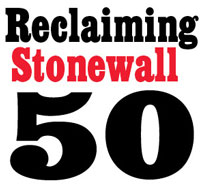 Resistance is possible. That’s the in-a-nutshell legacy of the anti-oppression rioting that transpired in and around the Stonewall Inn on Christopher Street in New York’s Greenwich Village over a few days in late June 1969. At a moment when reactionary politics are ascendant the world over, and resistance may feel futile, that’s a powerful legacy to bequeath to a present that needs all the inspiration it can find.
Resistance is possible. That’s the in-a-nutshell legacy of the anti-oppression rioting that transpired in and around the Stonewall Inn on Christopher Street in New York’s Greenwich Village over a few days in late June 1969. At a moment when reactionary politics are ascendant the world over, and resistance may feel futile, that’s a powerful legacy to bequeath to a present that needs all the inspiration it can find.
It’s important to remember that Stonewall was not the first instance of collective resistance on the part of people who suffer social oppression and state-sanctioned violence based on their sexuality and gender expression. It was simply the biggest, and the most publicized. Its notoriety is due in large part to the already galvanized activists of the day who decided within a week of the rioting to commemorate it a year later with a “Christopher Street Liberation Day” march and rally that became the progenitor of all the rainbow-flag-waving Pride events that have blossomed over the past half-century.
In May 1959, LGBTQ people congregated outside Cooper Do-Nuts, a late-night hangout conveniently situated between two popular gay bars in the Skid Row neighborhood of Los Angeles, spontaneously pushed back against police harassment, and succeeded in liberating several individuals in police custody. In August 1961, patrons of Milwaukee’s Black Nite gay bar resisted the invasion of their turf by a drunken gang of homophobic soldiers in an epic brawl. In 1964, gender-nonconforming youth of color who’d been denied service at Dewey’s restaurant in Philadelphia quietly staged a lunch-counter sit-in that changed the eatery’s policies. More militant resistance erupted in 1966 at Compton’s Cafeteria, at the corner of Turk and Taylor in San Francisco’s Tenderloin, when the pent-up anger of the street queens who patronized it, sick of police violence, boiled over during a routine sweep to round them up, and the fighting there spilled out into the surrounding streets. Later that same year, the entrapment by undercover cops of gay patrons of the Black Cat Tavern in Los Angeles on New Year’s Eve, resulted in hundreds’ protesting outside the bar a few weeks later and sparked the founding of The Advocate, now the leading national LGBTQ news magazine.
Rather than undermining Stonewall’s legacy, this (undoubtedly partial) list of known acts of collective resistance to oppression on the part of queer people before June 1969 is a reminder that its justly memorable enactment of defiance and pride was not a unicorn event, not a fluke, not a one-off, not the result of any single person’s heroism or bravery. Rather, it was the crest of a rising wave of gay empowerment that drew force from many sources: not just from the criminalization of homosexual acts and transgender expression that put targets on our backs and authorized police misconduct in the name of law and order, but from other social movements organized around minority identity—especially the black struggle for freedom and the burgeoning feminist movement. It was part, too, of the larger mass protest culture sparked by the pointless war in Vietnam, which linked opposition to the US government’s foreign policy with Third World liberation and calls for social transformation at home. It was a resistance whose time had come.
Over the past few years, many of the hard-won victories LGBTQ people have secured for themselves over the half-century since Stonewall have been eroded—especially those that benefit transgender people. This stripping away of existing rights is of a piece with a broader assault on voting, the drive to push abortion back underground, and the surge of an ethno-nationalist grievance culture that imagines queers, feminists, racial minorities, and immigrants as threats to the purity and supremacy of the (white) population. We live in a moment of danger, when democracy itself faces unprecedented risks. There could be no better time to remember that resistance to systemic injustice on the part of the oppressed is not just possible, but that it can—and has—played a role in changing the world. If commemorating Stonewall helps keep that vital knowledge alive, it is justly and appropriately to be celebrated.


